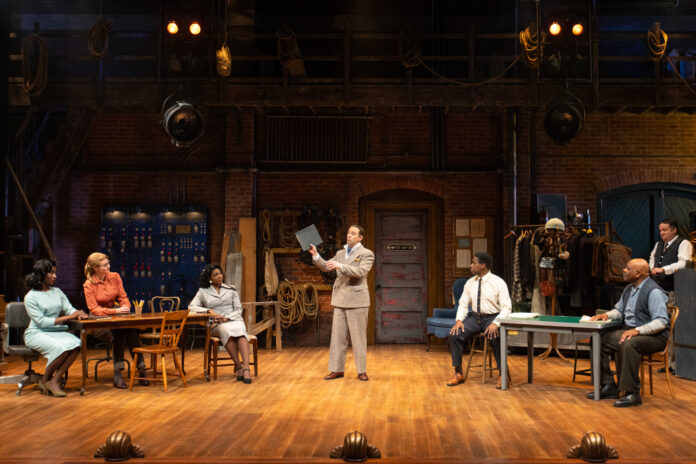
By A.L. Haynes, Contributing Writer
For those familiar with the genius of African-American author and playwright Alice Childress, Trouble In Mind is a wink-and-nod moment of the sly savante at her best. For some, it is a comedy with an unresolved ending. For the Black-American community, it is a slice-of-life even while being impossibly exaggerated. Wisely choosing experienced director Delicia Turner Sonnenberg, the Old Globe’s production of Trouble In Mind does an amazing job capturing the subtleties Childress built into her work.

Meant to debut on Broadway nearly 70 years ago, Trouble In Mind fell prey to the very oppression it was written to protest. Producers had Childress rewrite the ending so many times she gave up and let the play fade away. As Old Globe’s director Delicia Turner Sonnenberg notes, the overarching question is “Who gets to be the authority on a story about you?”

Written and set in the Jim Crow, “separate but equal” era, a key theme is how theater both transcends and reinforces social issues. We watch a play-within-a-play, observing all the actors using the same door and eating together in restaurants in seeming contradiction to the racism they despise. Yet the Black cast are severely stereotyped as “part of their job”, playing illiterate, overly naive characters. The show reflects eerily, with many of the underlying questions of equity and dignity still relevant today.
Trouble In Mind focuses on veteran Black actress, Wiletta Mayer (played by Ramona Keller). A supposedly anti-lynching play, coupled with an integrated cast and crew and an arrogantly eccentric director, cause her to confront both her own behaviors and those of the people around her in terms of race and respect. Special notice should be taken that The Globe’s production looks at not only racial, but gender inequalities, with Judy (played by Maggie Walters) finding more in common with the Black members of the production due to continual denigration.
Keller turns in a superlative performance as Wiletta, almost telling the audience more when she is not speaking. The interactions with the doorman, Henry (played by Tom Bloom), are particularly well done. Henry is a reference to an era when Irish Americans were considered “negroes” alongside Black Americans.

Childress does her best to present different Black experiences, even while painting with a broad brush. Michael Zachary Tunstill, Bibi Mama, and Victor Morris turn in strong performances, transforming near-caricatures into authentic, believable people. Featuring code-switch upon code-switch, Childress highlights an impossible problem found in most Black communities: What is more important – self-respect, survival, or comfort?
The emotions Childress looked to stir in the 1950s are still present in a modern audience. Snippets of overheard audience conversations featured comments like “It felt like it didn’t finish – I was waiting for the resolution” and “So was the problem with what the director said at the end…?”. This confused discontent came from those who will never live a Black experience. For them, Childress’ message is different: If you want resolution, resolve it; change the situation, confront your unconscious bias, take on the problem.
More than a simple comedy, Trouble In Mind is a rich layering of tropes and truths designed to reach different audiences on different levels. Well-cast and thoughtfully directed, The Old Globe’s production of Trouble In Mind is a slice-of-life and history that is well worth seeing. The show runs until March 13, 2022, and discount tickets are available on The Old Globe’s website (www.theoldglobe.org) with the code “Voice”.


